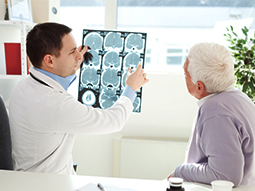-
Parkinson's disease: A chronic, progressive, neurodegenerative movement disorder of the brain characterized by tremors (shaking) and difficulty walking, moving, and coordinating.
-
Huntington’s disease: An inherited brain disorder that results in the progressive loss of physical control and mental faculties.
-
Dystonia: A movement disorder characterized by involuntary, continual muscular contractions. It can result in twisted, contorted postures of the body or limbs.
-
Essential tremor: The most common movement disorder is characterized by rhythmic shaking.
Parkinson's disease
Parkinson’s disease is a chronic, progressive neurodegenerative movement disorder. Characteristic primary symptoms of Parkinson’s include tremors, rigidity, slow movement (bradykinesia), poor balance, and difficulty walking (referred to as “parkinsonian gait”). Primary symptoms’ definitions:- Bradykinesia is slowness in voluntary movement. It produces difficulty initiating movement and difficulty completing movement once it is in progress. Delayed transmission of signals from the brain to the skeletal muscles, due to diminished dopamine, produces bradykinesia.
- Tremors in the hands, fingers, forearms, or feet tend to occur when a limb is at rest but not when performing tasks. Tremors can also occur in the mouth and chin.
- Rigidity (or stiff muscles) can produce muscle pain and an expressionless, mask-like face, and it tends to increase during movement.
- Poor balance happens when there is an impairment or loss of reflexes that adjust posture to help maintain balance.
- Parkinsonian gait is a distinctive unsteady walk associated with Parkinson’s disease. There is a tendency to lean unnaturally backward or forward, and to develop a stooped, head-down, shoulders-drooped stance. Arm swinging is diminished or absent, and people with Parkinson’s tend to take small shuffling steps (referred to as festination).
Huntington’s disease
Huntington’s disease is an inherited brain disorder that results in the progressive loss of physical control and mental faculties. Symptoms can include:
- Personality changes, mood swings, and depression
- Forgetfulness and impaired judgment
- Unsteady gait and involuntary movements
- Slurred speech and difficulty swallowing
Dystonia
Dystonia is a movement disorder characterized by involuntary, continual muscular contractions. It can result in twisted, contorted postures of the body or limbs. Movements are usually slow and may appear exaggerated. The many causes of this movement disorder include biochemical abnormalities, degenerative disorders, psychiatric dysfunction, toxins and drugs.
Essential tremor
Essential tremor is the most common movement disorder and is characterized by rhythmic shaking that occurs during voluntary movement (action tremor), such as lifting a cup to one's mouth or while voluntarily maintaining a position against gravity (postural tremor), such as reaching or extending one's hand or arm. It is less common when at rest.Some patients may have a family history of tremors that usually involves the arms and hands. The neurological exam is otherwise normal. If the tremor is disabling, medication can be useful.
Why choose us
Disorders such as these often have varied symptoms that appear at different times and may seem unrelated. Because of this, the specialists at MedStar Health provide detailed, comprehensive evaluations that lead to a more accurate diagnosis, as well as an individualized treatment plan tailored for each patient.
Our multidisciplinary teams consist of:
-
Neurologists
-
Neurosurgeons
-
Neuropsychologists
-
Neurophysiologists
Combining their expertise, these doctors work to improve a patient's quality of life by finding the right combination of therapies, which may include:
-
Physical and speech therapy
-
Exercise regimens
-
Medications
-
Botox injections
-
Deep brain stimulation
Our providers

Expert care for movement disorders
Getting the care you need starts with seeing one of our neurologists or neurosurgeons.
Our locations
Distance from Change locationEnter your location
MedStar Franklin Square Medical Center
9000 Franklin Square Dr. Baltimore, MD 21237
MedStar Good Samaritan Hospital
5601 Loch Raven Blvd. Baltimore, MD 21239
MedStar Harbor Hospital
3001 S. Hanover St. Baltimore, MD 21225
MedStar Union Memorial Hospital
201 E. University Pkwy. Baltimore, MD 21218
MedStar Georgetown University Hospital
3800 Reservoir Rd. NW Washington, DC, 20007
MedStar Montgomery Medical Center
18101 Prince Philip Dr. Olney, MD 20832
MedStar National Rehabilitation Hospital
102 Irving St. NW Washington, DC, 20010
MedStar Southern Maryland Hospital Center
7503 Surratts Rd. Clinton, MD 20735
MedStar St Mary's Hospital
25500 Point Lookout Rd. Leonardtown, MD 20650
MedStar Washington Hospital Center
110 Irving St. NW Washington, DC 20010









